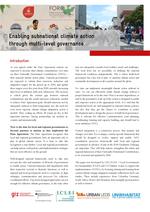Click here to register!
Enabling Subnational Climate Action through Multi-level Governance
Introduction
As was agreed under the Paris Agreement, nations are expected to increase their climate commitments over time via their Nationally Determined Contributions (NDCs) – their national climate action plans. National governments are expected to submit their emissions reduction and adaptation targets for the period up to 2030, and update these targets every five years from 2020 onwards, increasing their level of ambition with each submission. This increase is critical given the current gap between national commitments and the actual emissions reductions needed to achieve Paris Agreement goals. Should emissions not be adequately reduced to limit temperature rise, the need for even more vigorous climate change adaptation action is needed. Thus, scaling up efforts all round are key at this important juncture. Strong partnerships are needed, in-country and internationally.
Now is the time for local and regional governments to become partners to nations as they implement the Paris Agreement. The Paris Agreement recognizes that local and regional governments have an important role to play in global climate action. It is time to take this recognition a step further. Local and regional governments can help nations craft policies and implementation strategies that are most effective on the ground.
Well-designed national frameworks need to take into account the roles and mandates of all levels of government to enable action. National ministries and departments with their respective sectoral or thematic functions, as well as regional and local governments need to cooperate, to align strategies, communication and processes for collective coordinated efforts. Top-down designed approaches are not enough for effective climate governance, as the state often may not adequately consider local realities, needs and challenges. The local level has no possibility of defining the national framework conditions independently. This is where multi-level governance has a key role to play to optimize climate action and sustainable development in all countries around the globe.
No state can implement meaningful climate action without its cities. No city can effectively tackle climate change without a proper framework set by the state. Here is an inter-dependence, as well as the potential to scale up if the system is designed to enable and empower action at the appropriate levels. It is vital that the subnational levels are well integrated in national climate policies, but also that they get the chance to contribute to policy development and co-design the process of multi-level governance. This is relevant for effective communication, joint planning, coordinating, learning and capacity building, and should lead to more ambitious NDCs.
Vertical integration is a continuous process that matures and changes over time. It is a unique, country-specific framework that should be designed to evolve, support and enable. NDC consultation processes domestically with local and regional governments in advance of and at the 2018 Facilitative Dialogue are important. They will help nations strengthen the urban and regional dimension of their Nationally Determined Contributions, to be reviewed and updated by 2020.
This paper was developed by GIZ, ICLEI – Local Governments for Sustainability (ICLEI) and UN-Habitat. It aims to support the implementation of NDCs, by fostering sharing and learning from current climate change mitigation examples reflected in short case studies. These include experiences from Colombia, Germany, South Africa, Mexico and Myanmar, that exemplify good practices as well as barriers.
Download the Publication
Further Information
Reference
Authors:
Pasquale Capizzi, UN-Habitat
Emily Castro, GIZ
Ingrid Gonzalez, Independent Consultant for GIZ
Robert Kehew, UN-Habitat
Jakob Lindemann, GIZ
Patricia Lizarazo UN-Habitat
Tangmar Marmon, GIZ
Maryke van Staden, ICLEI
This paper is developed by GIZ, ICLEI – Local Governments for Sustainability (ICLEI) and UN-Habitat.




















